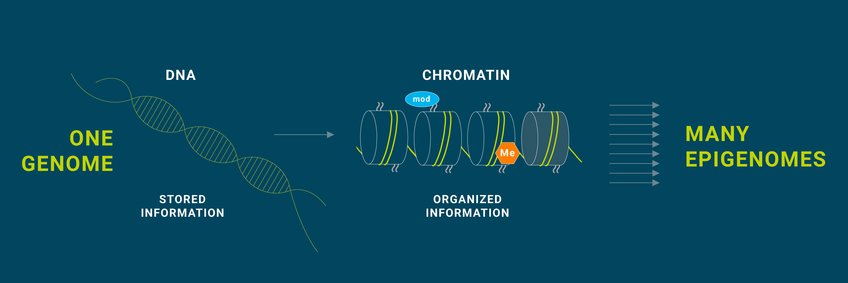
Focus Epigenetics
“Are we more than the sum of our genes and how can environmental cues alter gene expression?” While almost all cell types (ca. 200) within a human body share an identical DNA sequence, its utilization will differ significantly according to their designated function of a cell. The DNA template within the cell nucleus is wrapped and protected by specific proteins (histones). This DNA-histone polymer is called chromatin. Stable chromatin alterations that do not affect the DNA sequence, are summarized under the term ‘Epigenetics‘.
Due to the plasticity of chromatin states a genome has a variety of epigenetic variants (epigenomes). Establishment and maintenance of these epigenomes is critical for embryonic development, cell type identity and cell differentiation.
Although many diseases (e.g. cancer, neurodegenerative and metabolic disorders) are primarily caused by DNA mutations, epigenetic disregulation can significantly contribute to disease progression. Thus, epigenetic research promises far-reaching implications for new forms of therapy and diagnosis.
Epigenetic changes also allow responses to environmental influences such as nutrition, stress and hormones. Intriguingly, there is growing evidence that epigenetic alterations might even be inheritable over a few generations.
The research groups of the Epigenetic Focus combine topics addressing dosage compensation, heterochromatin formation, and posttranslational modifications of histones. A variety of model organisms and experimental approaches (biochemistry, cell biology, Drosophila and mouse genetics, genome-wide profiling) are used to dissect the epigenome of distinct cell types.
Group Leaders – Focus Epigenetics
Jumana AlHaj Abed | Asifa Akhtar | Ibrahim Cissé | Ayele Argaw Denboba
Valentin Flury | Juliane Glaser | Valérie Hilgers | Nicola Iovino | Thomas Jenuwein